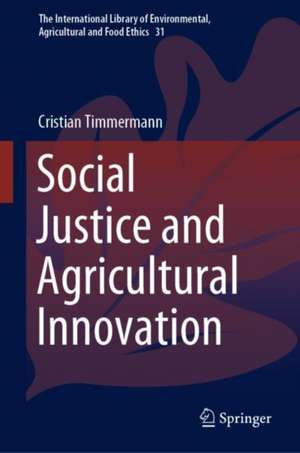Social Justice and Agricultural Innovation: The International Library of Environmental, Agricultural and Food Ethics, cartea 31
Autor Cristian Timmermannen Limba Engleză Hardback – 27 aug 2020
| Toate formatele și edițiile | Preț | Express |
|---|---|---|
| Paperback (1) | 385.62 lei 6-8 săpt. | |
| Springer International Publishing – 27 aug 2021 | 385.62 lei 6-8 săpt. | |
| Hardback (1) | 375.76 lei 38-44 zile | |
| Springer International Publishing – 27 aug 2020 | 375.76 lei 38-44 zile |
Din seria The International Library of Environmental, Agricultural and Food Ethics
- 15%
 Preț: 707.96 lei
Preț: 707.96 lei -
 Preț: 451.76 lei
Preț: 451.76 lei - 18%
 Preț: 731.10 lei
Preț: 731.10 lei - 18%
 Preț: 744.53 lei
Preț: 744.53 lei - 18%
 Preț: 899.87 lei
Preț: 899.87 lei - 18%
 Preț: 1831.27 lei
Preț: 1831.27 lei - 15%
 Preț: 644.82 lei
Preț: 644.82 lei - 15%
 Preț: 643.16 lei
Preț: 643.16 lei - 18%
 Preț: 947.04 lei
Preț: 947.04 lei - 18%
 Preț: 953.20 lei
Preț: 953.20 lei - 15%
 Preț: 646.62 lei
Preț: 646.62 lei - 15%
 Preț: 646.75 lei
Preț: 646.75 lei - 18%
 Preț: 1116.40 lei
Preț: 1116.40 lei - 15%
 Preț: 643.99 lei
Preț: 643.99 lei - 18%
 Preț: 953.65 lei
Preț: 953.65 lei - 15%
 Preț: 645.28 lei
Preț: 645.28 lei - 15%
 Preț: 637.28 lei
Preț: 637.28 lei - 18%
 Preț: 786.66 lei
Preț: 786.66 lei - 15%
 Preț: 644.30 lei
Preț: 644.30 lei -
 Preț: 398.74 lei
Preț: 398.74 lei - 18%
 Preț: 902.69 lei
Preț: 902.69 lei - 24%
 Preț: 697.63 lei
Preț: 697.63 lei -
 Preț: 388.52 lei
Preț: 388.52 lei - 20%
 Preț: 570.97 lei
Preț: 570.97 lei - 18%
 Preț: 784.61 lei
Preț: 784.61 lei - 15%
 Preț: 527.79 lei
Preț: 527.79 lei - 24%
 Preț: 635.50 lei
Preț: 635.50 lei - 15%
 Preț: 647.08 lei
Preț: 647.08 lei
Preț: 375.76 lei
Nou
Puncte Express: 564
Preț estimativ în valută:
71.90€ • 75.22$ • 59.73£
71.90€ • 75.22$ • 59.73£
Carte tipărită la comandă
Livrare economică 29 martie-04 aprilie
Preluare comenzi: 021 569.72.76
Specificații
ISBN-13: 9783030561925
ISBN-10: 3030561925
Pagini: 236
Ilustrații: XV, 236 p. 4 illus., 3 illus. in color.
Dimensiuni: 155 x 235 mm
Ediția:1st ed. 2020
Editura: Springer International Publishing
Colecția Springer
Seria The International Library of Environmental, Agricultural and Food Ethics
Locul publicării:Cham, Switzerland
ISBN-10: 3030561925
Pagini: 236
Ilustrații: XV, 236 p. 4 illus., 3 illus. in color.
Dimensiuni: 155 x 235 mm
Ediția:1st ed. 2020
Editura: Springer International Publishing
Colecția Springer
Seria The International Library of Environmental, Agricultural and Food Ethics
Locul publicării:Cham, Switzerland
Cuprins
Introduction: Key social challenges in agricultural innovation.- Intellectual property regimes and their impact on agricultural research and development.- Non-proprietary science and agricultural innovation.- Distributing research attention.- Agricultural innovation and commutative justice: balancing fair rewards and adequate access.- Contributive justice: on the importance of inclusive agricultural innovation.- Intergenerational justice and science for long-term agricultural sustainability.- Procedural justice.- Restorative justice.- Conclusion – in favour of multifunctionality of agriculture
Notă biografică
Cristian Timmermann, PhD, studied philosophy and political science at the Ludwig-Maximilian University, Germany, and Wageningen University, the Netherlands. He is currently a researcher at the Universidad de Chile, after holding research positions at the Universidad Nacional Autónoma de México and the Ben-Gurion University of the Negev, Israel, and academic stays in Manchester, Rome, Salzburg, Louvain-la-Neuve and Brisbane, as well as the Brocher Foundation and The Hastings Center. His research areas include agricultural ethics, global justice, science policy, resource governance and property theories. His work has been published in, among others, Agriculture and Human Values, Science and Engineering Ethics, Journal of Agricultural and Environmental Ethics, Agroecology and Sustainable Food Systems, and Social Justice Research.
Textul de pe ultima copertă
Employing a social justice framework, this book examines the effects of innovation incentives and policies in agriculture. It addresses access to the objects of innovation, the direction of science and the type of innovations that are available, opportunities to participate in research and development, as well as effects on future generations. The book examines the potential value of preventive and reconciliatory measures, drawing on concepts from procedural and restorative justice. As such it offers a comprehensive analysis of the main social justice dimensions affected by agricultural innovation. It gives academics and policy analysts an extensive overview of the deep impact of innovation on society and the environment, and the expectations the general public has from the scientific community.
Caracteristici
The first book to provide an extensive overview of how innovation in agriculture affects different forms of social justice Uses a wide range of philosophical perspectives to highlight the diversity of social issues involved in agricultural innovation Brings together key theories of justice to provide a new perspective on the much-debated issue of technology assessment in agriculture
